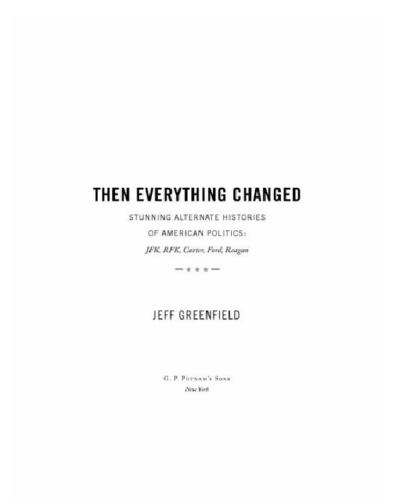
Then Everything Changed
Stunning Alternate Histories of American Politics JFK, RFK, Carter, Ford, Reagan
کتاب های مرتبط
- اطلاعات
- نقد و بررسی
- دیدگاه کاربران
نقد و بررسی

January 10, 2011
Speculation isn't history, but it's catnip to pundits and journalists like veteran CBS News reporter and commentator Greenfield (The Real Campaign), who can be excused for this romp into what ifs. He rightly says that alternative history's foundation is plausibility. And since he's read widely in the sources, his excursions into possible histories are decently anchored to the ground. In the first narrative, an actual failed attempt to assassinate JFK before his inauguration instead succeeds. LBJ takes his place, Guantánamo is wiped out by a rogue Soviet missile, and war with the U.S.S.R. is only narrowly averted. In the second narrative, Robert Kennedy isn't assassinated, beats Nixon in 1968, winds down the Vietnam War, and with no Watergate scandal, the cultural changes of the 1970s are averted. The third account has Ford winning re-election, but in 1980 it's Hart vs. Reagan, and Hart wins. Of course, there are other possible scenarios, which Greenfield doesn't discuss. And in these novelistic narratives, readers drown in excess, irrelevant detail (dinner menus, precise times of meetings, exact conversations)—all wonkish pundit stuff, and none essential to Greenfield's purpose. In the end, fun but insubstantial.

January 1, 2011
For want of iron will on the part of an assassin, John F. Kennedy lived a few years longer than he might have.
Such is the stuff of counterfactual history, which scholars are not supposed to engage in—but in which Greenfield (Oh, Waiter, One Order of Crow! Inside the Strangest Presidential Election Finish in American History, 2001, etc.), a longtime TV journalist, revels. But this is not the "what if Custer had a helicopter" flavor of counterfactuality. Instead, the author offers three extensive and conjoined thought experiments centered on three turning points. In 1960, a suicide bomber failed to detonate his charge at president-elect Kennedy's front door, deterred by the sight of his wife, Jacqueline. But what if he had carried out his mission? Lyndon Johnson would have become president, and the tenor of modern history might have changed with that mere shift of chronology. And who might he have chosen for vice president? After surviving a constitutional crisis mounted by a young William F. Buckley, Johnson might have named Bobby Kennedy, of course—though he might also have reached across the aisle to draft Nelson Rockefeller, "like Johnson...a Cold War internationalist" who relished any opportunity to face down the Russians. And then what? The Cuban Missile Crisis would have developed into an actual shooting war, including, for the first time since World War II, "nuclear weapons...employed in a military conflict." And what would that have done to LBJ's chances of being reelected? Greenfield unfolds scenario after scenario to show that history can turn on the smallest of moments, and then he examines the real historical record to ponder some of the attendant ironies.
Politics wonks will find much to chew on here, and sci-fi writers might find a few what-if moments to play with as well.
(COPYRIGHT (2011) KIRKUS REVIEWS/NIELSEN BUSINESS MEDIA, INC. ALL RIGHTS RESERVED.)

February 1, 2011
Greenfield (senior political correspondent, CBS News; The People's Choice: A Novel) offers three what-if political tales with a familiar cast of Presidents and politicos operating in alternate but plausible historical circumstances. This is a particularly good contribution to the alternate history genre because it relies on nonfiction works, memoirs, and the author's experience as a political pundit. Greenfield's spirited writing reaches its high point when he describes how the Cuban Missile Crisis resulted in a limited nuclear war in 1962 during Lyndon Johnson's presidency (Johnson became President in January 1961, one month after president-elect Kennedy was killed in a bomb explosion). The second story explores Robert F. Kennedy's election and turbulent presidency, following the failed assassination attempt by Sirhan Sirhan after the 1968 California primary. The final scenario weaves a complex web of Gerald Ford defeating Jimmy Carter in 1976, followed by Ford's failed presidency, and the 1980 election of Gary Hart, who defeated Ronald Reagan in a close race. Readers will snicker over the ending's indication that the more things change, the more they stay the same. VERDICT This book will hold the interest of those who enjoy political thrillers but will greatly appeal to nonfiction readers of this convulsive era.--Karl Helicher, Upper Merion Twp. Lib., King of Prussia, PA
Copyright 2011 Library Journal, LLC Used with permission.

February 15, 2011
Greenfield, chief political correspondent for CBS News, is also a successful novelist. Here, he tries something different: alternate history, delivering takes on three different moments in the not-so-distant American past. Not many people remember that in December 1960, President-elect Kennedy was almost assassinated. What if Richard Pavlick had gotten to Kennedy three years before Lee Harvey Oswald? Conversely, what if Robert Kennedy had not gone through the kitchen of a Los Angeles hotel where Sirhan Sirhan lay in wait? And, in 1976, had Gerald Ford not made a mistake in his debate with Jimmy Carter, that election might have gone a different way. Inevitably, speculation plays a role in Greenfields accounts, but he bolsters possible scenarios with ancedotes, quotes, and oral histories, all of which are sourced at the end of the book. This reliance on sources is why Greenfield prefers that his work be called nonfiction, though some may disagree. Perhaps readers who remember the actual events and casts of players will be the books best audience, but any history buff will appreciate these fascinating reinterpertations.(Reprinted with permission of Booklist, copyright 2011, American Library Association.)

























دیدگاه کاربران